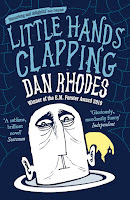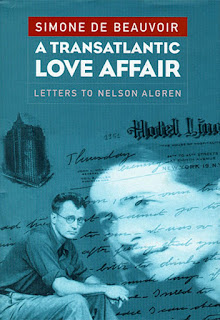Dan Rhodes' Little Hands Clapping
All of Dan Rhodes' fiction has in common a predilection for the odd, grotesque and macabre, and he is at his most grisly in 2010's Little Hands Clapping
Of
the trickle of curious visitors that comes into the museum, some arrive
with a specific purpose in mind, one that is at odds with the
designated aim of the place. Pavarotti's wife intended it as a place
that might discourage potential suicides, but its success in achieving
this objective is far from definitive. According to one press cutting
about the museum, it is 'incoherent and insensitive', though the same
article describes it as 'a handy advice shop for the emotionally
fragile.' At any rate, fairly regular suicides take place within the
museum and, in a sinister supernatural detail, it is at the exact
moments when people kill themselves in the building that a spider creeps
into the old man's mouth. It is in these deaths that the wider plot of
Little Hands Clapping is grounded; Herr Schmidt has developed a
professional relationship with a local doctor, Ernst Frölicher, who
retrieves the corpses from the museum. If the old man has strange
eating habits, then these are more than matched by those of the doctor,
who keeps four chest freezers full of cadavers in his garage.
The
peculiar mixture of horror, comedy and pathos that Rhodes deploys comes
to a point of intersection in Doctor Frölicher, whose cannibalistic
habits are somewhat anomalous with his virtuous character. Frölicher
makes a point of drinking fair-trade coffee and tries to keeps his
freezers full so as to increase their efficiency. His taste for human
flesh is not a perversion, but an addiction; he assumes that all doctors
must try it at some time but, having sampled a kidney early on his
career, he is unable to quit - although some of the offal is now
reserved for his dog. He connects the habit to his strict ethical code
by treating his unorthodox disposal of the bodies as a means of
protecting the museum and its management from disgrace. The old man has
no comparable ethics. He too wishes to conceal the suicides from
Pavarotti's wife, but this is neither to protect her nor to subvert her
work, but simply so that the responsibilities of his job are kept to a
minimum.
The old man is a flat character, a
straightforward villain Indeed, Rhodes' characters are often pawns,
whose frequently tragic destinies cannot be changed. He never comes
across as an omnipotent narrator, however; it is as though he is merely
the storyteller, who narrates events as they happened. This has been a
constant in his work, which has often tended to eschew familiar
locations in favour of more unknown places that can more easily be
mythologised. Although he is a British writer, he has set only one of
his novels in the UK (Gold ,
whose action takes places in a quiet Welsh village), and a number of
his short stories are completely devoid of any sense of place at all.
Little Hands Clapping is set partly in Portugal, but predominantly in
the German town that is home to the suicide museum. No distinctive
details are assigned to this town, making it impossible to locate, and
impossible to determine whether it is supposed to be based on an actual
location.
,
whose action takes places in a quiet Welsh village), and a number of
his short stories are completely devoid of any sense of place at all.
Little Hands Clapping is set partly in Portugal, but predominantly in
the German town that is home to the suicide museum. No distinctive
details are assigned to this town, making it impossible to locate, and
impossible to determine whether it is supposed to be based on an actual
location.
However, one actual place alluded to
in the novel functions as its cultural, even if not its geographical,
setting. This is the town of Hamelin, best known for the legend of the
Pied Piper who was called in to rid the place of rats but, following a
dispute over remuneration, also lured away all of its children. Indeed,
Robert Browning's interpretation of the legend provides Rhodes with his
title:
Small feet were pattering, wooden shoes clattering,Little hands clapping and little tongues chattering,And, like fowls in a farm-yard when barley is scattering,Out came the children running.
Hamelin
makes an appearance in the novel as the birthplace of Pavarotti's wife,
who was so disturbed by this story that she felt the need to do
something positive - hence the founding of her museum. Upon first
glance, this may appear to be just one more of Rhodes' throwaway
comments about a character's eccentricities. But, in the context of
this particular novel, it has deeper meaning, aligning Little Hands Clapping
with the folktale tradition that is implicit in his earlier work. By
including the reference to the Pied Piper legend, Rhodes situates his
placeless narrative in the same folkloric world; his Germany is the same
Germany as that of the Hamelin of that legend.
It has the same black humour, too. Browning's version
of The Pied Piper of Hamelin is at once playful and dark, telling the
story of the ensnared children in language that skips like those
children's little feet. Rhodes uses comic rather than poetic language
to produce his tone, but the resulting effect is similar. The grey old
man is a kind of inverted Pied Piper, and all the more sinister for his
muteness. While the Pied Piper legend tells of children being led away
from their town, Little Hands Clapping tells of people being drawn
towards the suicide museum. But the darkly capricious style is not
quite sustained for the entire length of the novel. As it draws towards
its climax, the uneasy humour descends into outright farce, reaching
its nadir in an episode in which Frölicher's dog throws up a human
penis. One of the reviews of the suicide museum that are quoted in Little Hands Clapping
describes it as, 'A curious mixture of stark, disturbing realism and
high camp.' This can almost be taken as a description of the text in
which it is embedded. Some of the events in the novel may seem to be
absurd and unrealistic, but the book is consistently realistic in its
portrayal of human feeling. This earths the more outlandish elements -
though not fully, leaving the novel teetering just over the edge of
plausibility and confirming it as a modern and macabre folk tale.
Review by Alan Ashton-Smith


